- Home
- Steven Harper
Offspring
Offspring Read online
Table of Contents
OFFSPRING: A NOVEL OF THE SILENT EMPIRE
ACKNOWLEDGMENTS
CHAPTER ONE
CHAPTER TWO
CHAPTER THREE
CHAPTER FOUR
CHAPTER FIVE
CHAPTER SIX
CHAPTER SEVEN
CHAPTER EIGHT
CHAPTER NINE
CHAPTER TEN
CHAPTER ELEVEN
CHAPTER TWELVE
CHAPTER THIRTEEN
CHAPTER FOURTEEN
CHAPTER FIFTEEN
CHAPTER SIXTEEN
CHAPTER SEVENTEEN
CHAPTER EIGHTEEN
CHAPTER NINETEEN
OFFSPRING: A NOVEL OF THE SILENT EMPIRE
by Steven Harper
Praise for Steven Harper's
novels of the Silent Empire
Dreamer
“This exceptional first novel in a new series is a satisfying and complete work in itself. A diverse array of memorable characters and worlds makes this a book [to] relate to and enjoy.”
—School Library Journal
“This series opener should appeal to lovers of far-future space opera and sf adventure.”
—Library Journal
“In terms of narrative and world building, this is definitely a well-told tale, and Harper’s skill at characterization is significantly above average. Moreover, his extrapolation of aboriginal Australian myth freshens the shopworn theme of telepathy. Even the future slums he imagines are memorably vivid.”
—Booklist
“A fresh, original story…a clever concept…an exciting tale.”
—BookBrowser
“Harper is a promising writer.”
—On Spec
Nightmare
“A thoroughly solid sequel, highly recommended to those who enjoyed its predecessor.”
—Booklist
“[Kendi’s] ability to overcome the traumas he has endured make him a hero worth rooting for by the enthralled audience.”
—BookBrowser
Trickster
“The action remains fast, furious, and absorbing.”
—Booklist
“Steven Harper is a genius when it comes to believable world building.”
—Midwest Book Review
“I read the last hundred pages in sitting. I just couldn’t put it down.”
—eBook-Reviews.net
The Silent Empire
DREAMER
NIGHTMARE
TRICKSTER
OFFSPRING
First published by Roc, an imprint of New American Library, a division of Penguin Group (USA) Inc.
Offspring Copyright © Steven Harper 2004
All rights reserved
Without limiting the rights under copyright reserved above, no part of this publication may be reproduced, stored in, or introduced into a retrieval system, or transmitted in any form, or by any means without the prior written permission of the copyright owner.
This is a work of fiction. Names, characters, places, and incidents either are the product of the author’s imagination or are used fictitiously, and any resemblance to actual persons, living or dead, business establishments, events, or locales, is entirely coincidental.
ACKNOWLEDGMENTS
Gratitude forevermore to the Untitled Writers Group (Karen Everson, Anne Harris, Jonathan Jarrard, Lisa Leutheuser, Erica Schippers, Catherine Shaffer, Shannon White, and Sarah Zettel) for sympathetic ears and unsympathetic critiques.
Gratitude also goes to Deirdre Saoirse Moen and Christina Stitt for critiques of the early chapters. Jim Morrow’s advice was also greatly appreciated.
Jana Sibson, Esq., gave valuable advice about custody cases involving children, both born and unborn.
To Aran, my own child.
CHAPTER ONE
“Playing games helps children learn to live by rules and learn the difference between fair play and exploitation.”
—Irfan Qasad
The game representative flashed a killer smile, and Father Kendi Weaver shifted uneasily in his office chair. Killer smiles always made Kendi uneasy.
“We’re offering generous terms,” the game rep continued earnestly. “A five hundred thousand freemark advance against three percent royalties on the first two million copies, four point five percent on every copy after that. You don’t have to offer anything but your endorsement. We do all the work—writing, developing, marketing. You just sit back and rake it in. Easy money. But we have to know now so we can get production moving, strike while the iron is hot.”
Kendi tapped his fingers on his desk and looked at the holographic models on the table in front of him. One was a representation of himself, a tall, dark-skinned man with tightly-curled hair, a flat nose, and a whipcord build. Australian Aborigine to the core, though Kendi preferred the term “Real People.” Next to Kendi’s hologram stood a model of Ben. He was shorter than Kendi, stocky, red-haired, and damned handsome, especially in the spring sunlight that streamed through the office window.
Kendi’s office was, like most offices at the monastery, small and cramped, with wood-paneled walls and a hardwood floor. To combat the lack of room, Kendi kept his space austere. His desk was bare, and there was only one chair for guests. The windowsill, which looked out into leafy talltree branches, had a precious few holograms on it—Ben and Kendi arm-in-arm on a beach, a motherly woman with dark hair, a representation of Real People cave paintings. A pair of pictures hung on the walls, both pen-and-ink drawings of Outback landscapes.
A third hologram waited to one side on Kendi’s desk. It portrayed a chesty blond woman, blue-eyed and beautiful. Kendi picked it up by the base.
“Who's this supposed to be, Mr. Brace?” he asked. “She looks familiar, but I can’t place her.”
“Ah. That would be Sister Gretchen Beyer.”
Kendi almost dropped the hologram. “Gretchen?” he spluttered. “It looks nothing like her. What did you do, stuff balloons under her—”
“We had to modify her a little,” Tel Brace said smoothly. “After all, sim-game heroes are larger-than-life. People have expectations.”
“Anything that big would be more of a surprise than an expectation,” Kendi muttered. “Why do you have a workup of her in the first place? I mean, she was important to everything that happened during the Despair, but other people were more instrumental, you know?”
“She’s your romantic alternate.”
Kendi blinked. “Come again?”
“Part of the sim-game involves a romantic subplot,” Brace said. “This version allows the players a choice of partner—Ben or Gretchen.”
“A choice of partner.”
“We want to appeal to the broadest possible base,” Brace explained. His golden hair shone in the sunlight, and a part of Kendi wondered if HyperFlight Games had chosen Brace to approach Kendi because of his good looks. “There will certainly be a segment of players—male and female—who will be more interested in playing up a romance with a woman, and we have to meet that need. It’s a standard development tactic.”
“I see. What did Gretchen have to say about this?”
“I’m not at liberty to discuss Sister Gretchen’s negotiations, Father. I’m sorry.”
“What are you going to call this game again?”
“ ‘Dream and Despair.’ Marketing predicts it’ll be one of the biggest sellers in all history, rivaling even ‘The Siege of Treetown.’ You and your family will be set for life, Father. All you have to do is sign and watch the freemarks roll in.”
Kendi toyed with the hologram in his hands. Dream and Despair. An apt title. The galaxy had once been dependent on the Dream, a telepathic plane of existence that only telepaths known as the Silent could reach. Within the Dream,
language and distance were no barrier to communication. In a galaxy where faster-than-light travel was cheap and faster-than-light communication was impossible, the Silent had become essential, allowing governments, corporations, and other entities to maintain quick communication with outlying branches, subsidiaries, and colonies.
Then came the Despair. Terrible forces had torn the Dream asunder, and the Silent found themselves exiled from its haven. Bereft of the Dream’s touch, many Silent became despondent, even suicidal. Kendi, Ben, Gretchen, and several others had been caught in the maelstrom of the Despair, and they had managed to keep the Dream from self-destruction, but only barely. Now only a tiny handful of Silent could enter the Dream, and the place had become a near-wasteland. Unable to communicate with their allies and subsidiaries, governments and corporations plunged into chaos. Many fell apart or went bankrupt. Some rulers grabbed power, others abandoned it. The Empress Kan maja Kalii, ruler of the Independence Confederation had, for example, disappeared without a trace.
Now a company called HyperFlight Games wanted to make a history sim-game out of it all, with Kendi as the hero.
Part of Kendi was flattered. The rest of him was suspicious. Tel Brace had a low, smooth voice and an earnest manner, both of which flared Kendi’s nostrils. He also recognized the elements of a good con game—a demand for a quick decision, smooth explanations, overly friendly demeanor—and he gave Tel Brace a mental salute, one con artist to another.
“I’ll need time to think about it,” Kendi said, still holding the Gretchen hologram. “Consult with some people, sniff around, you know. Leave me a copy of the offer and I’ll get back to you.”
“I don’t know how long I can keep the offer open,” Brace said, racking up another con game point on Kendi’s mental tally. “The boss is riding me, you know?”
“I’m sure,” Kendi said. Now he’ll take me into his confidence, he thought. Make me feel sorry for him.
“Tell the truth,” Brace continued conspiratorially, “I’m really hoping you can help me out. The economy is still bad after the Despair, and I haven’t been able to seal any decent contracts in months. I’m worried about my kids. Things got even rougher after their mother left. Do you have children, Father?”
“Not yet,” Kendi said, and held up his comp-unit. “I need time to consider your offer, Mr. Brace, so please zap me the terms. I have a lot to do today.”
Brace managed a weak grin, one completely unlike the mega-watt version he had used earlier. “Right. Here it is, then.” He aimed his own comp-unit at Kendi’s. A green light flashed on each, indicating a successful data transfer. Brace stood up and held out his hand. Kendi rose to shake it. Brace’s grip was dry and firm.
“Keep the holograms as our gift, Father,” Brace said. “I hope to do business with you soon.”
After the man left, Kendi checked his messages. His public box was crammed. Four offers for speaking engagements. Sixteen requests for information about himself. Eighteen sales pitches. Twelve requests to let someone write his biography. Thirty-five people writing to say they appreciated what he had done for the Dream. Forty nasty letters asking why he hadn’t simply let the Dream die. Nine marriage proposals. Two death threats. And over a hundred solicitations for more...personal services.
Kendi forwarded the death threats to the Guardians, deleted the rest, and called up the Hyperflight Games agreement to skim. His brow furrowed. Was he reading it right? According to the contract, he would have no input on the final version of the game. Hyperflight would also have the right to use his name and likeness for any advertising they liked, whether it related to the game or not, and the agreement lasted one hundred years after Kendi’s death. The royalties, meanwhile, came off the net profits, not the gross take. Kendi narrowed his eyes. No sim-game, movie, or music feed had ever made a profit, and the companies employed teams of accountants to prove it.
Kendi sighed and shut the comp-unit off. As the display winked out, his eye fell on the holograms lined up on the desk, and a thought occurred to him. A bit of rummaging in a drawer turned up a small scanner, which he ran over the base of each hologram. When he reached Ben’s hologram, the scanner beeped once. Kendi glanced at the readout and shook his head with a tight smile. He looked at Ben’s holo for a long moment, then tapped his earpiece. “Ben,” he said. His earpiece started to connect the call, but Kendi interrupted the connection with another tap, stopping the call entirely. He waited a moment in silence, then spoke to the empty air.
“Hey, Ben, it’s me. Fine. Uh huh. Well, I just met with the sim-game guy. The offer looks pretty good, I think, but I’m a little unsure. What’s the savings account like? Oh. Did you talk to the bank about the home improvement loan for the nursery? Oh. That bad? What about that contract job you were bidding on? You’re kidding! They gave it to who? All life, we needed that money. What kind of assholes would—yeah, I know. Okay. Well, maybe this sim-game offer is just what we need then. I’ll see you when I get home.”
With that, Kendi pocketed his comp-unit, exited the office building, and walked straight into a demonstration parade.
Most of the participants were human, though a substantial number were Ched-Balaar. They carried signs, both placard and holographic. Foxglove and the Federals: Our Friends! Foxglove Stands for Jobs! Vote for Foxglove and Feed My Family! Fox ‘Em Mitch! The Children of Irfan Eat While My Children Starve! The holographic signs were decorated with images of a man with dark hair and broad, handsome features.
The humans in the group were poorly dressed. Their patched clothes hung on them as if they had lost weight. The Ched-Balaar had a scruffy, disheveled look, and there was dust in their fur. One human woman had two small girls at her side. Both were thin and ragged, and they looked at Kendi with quiet eyes. He put a hand on the gold medallion he wore around his neck, the one that marked him as a Child of Irfan. Their mother followed their gaze and caught sight of Kendi in his loose brown robes. Her jaw firmed and she raised her sign as the procession marched past. Kendi wanted to do something for her, give her money or the jade ring he wore. But her face was hard and he knew such a gesture would only make her angry. A human voice broke into song. Immediately the Ched-Balaar joined in, chattering their teeth in rhythmic counterpoint. The procession came to a halt as everyone sang.
We all are prisoners of starvation
Fighting for emancipation!
We call upon each city-nation,
One union grand.
Little ones cry for bread
With their parents cold and dead.
The Federals lead us from this dread!
It’s our final stand.
A dark-skinned woman in dreadlocks and a hand-knit scarf climbed up on a balcony rail. She raised a placard that said Open Minds for Open Mines. Several of the holographic signs in the procession erased themselves and called up new text. We Can Mine Responsibly. We Aren’t Children—Let Us Work! A Mine Is a Terrible Thing to Waste.
“We are sitting on unimaginable wealth,” the woman shouted. “Bellerophon is rich in metal—gold, silver, iron, uranium, and more! And yet our people starve. How did we let this happen?”
Cheers of agreement roared through the talltree leaves.
“Our ancestors thought they were being wise when they laid the restrictions on mining and farming and talltree harvesting,” the woman shouted. “Perhaps were. Perhaps they preserved the environment. But that was almost a thousand years ago, and times have changed. We are responsible adults, not children. We can mine the planet’s resources without causing harm. Mining and farming and harvesting would mean jobs for the people!” More cheers. “Food for our children!” Cheers. “Security for everyone!” Cheers. “Mitchell Foxglove and the Federals opposed the mining restrictions long before the Despair, and he opposes them now. The Unionists and the Populists supported the restrictions, and look where it got us—frozen, starving, and afraid. Foxglove needs our vote, and we have to give it to him. Foxglove! Foxglove! Foxglove!”
The proc
ession took up the chant of Foxglove’s name and started marching again. The dreadlocked woman jumped down to join them. Protesters both human and Ched-Balaar continued along the office building walkway and tromped down a wide wooden staircase that wound around a talltree trunk. One of the little girls threw Kendi a last glance before marching out of sight.
Kendi sighed and released his medallion. The edges had dug furrows in his palm. How could he possibly get het up about a sim-game contract when people staved within ten meters of his office door? He privately decided to donate a portion of the sim-game proceeds to a charity that helped the hungry. Maybe the First Church of Irfan. Orphans and other needy people fell under their bailiwick.
The last of the procession cleared the walkway, and the Blessed and Most Beautiful Monastery of the Children of Irfan went back to moping through a crisp spring afternoon. The small audience that had gathered to watch the march drifted away like limp petals on a tired wind. Some were brown-robed monks—Children of Irfan—and others were lay people who worked for the monastery, though these days there were fewer and fewer jobs. Although most of the people were human or Ched-Balaar, a fair number of other species fed into the mix as well, and the air was filled with the quiet chatter of human voices, the muted clatter of Ched-Balaar tooth-talk, and the squeaks, squawks, and quacks of other species. Gondola cars strung on overhead cables coasted by, and a monorail train snaked between the massive talltree branches. Beneath the monastery’s swaying walkways lay the dizzying drop to Bellerophon’s forest floor over a hundred meters below. Overhead, the sun’s great golden eye hung in a field of perfect blue, and the air smelled of green leaves.
Kendi leaned on a heavy wooden railing and looked out over the arboreal monastery. A man and a woman in brown robes passed Kendi by, their voices barely audible. A teenage boy walked in silence with a being that looked like a giant caterpillar, and their steps dragged. Kendi sympathized. Before the Despair, all the monks at the monastery had been Silent, able to enter the Dream. After the Despair, only a tiny handful had retained their Silence. For the Silent, exile from the Dream was like being struck blind or deaf. Not everyone had adjusted well.

 The Importance of Being Kevin
The Importance of Being Kevin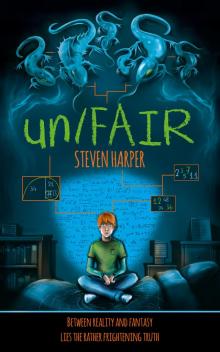 un/FAIR
un/FAIR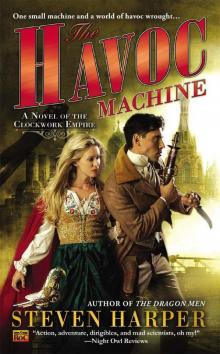 The Havoc Machine
The Havoc Machine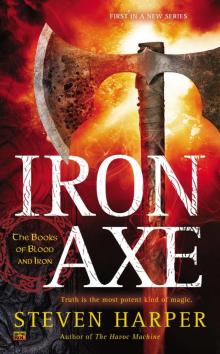 Iron Axe
Iron Axe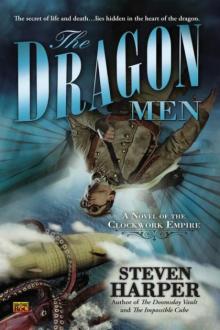 The Dragon Men
The Dragon Men The Doomsday Vault ce-1
The Doomsday Vault ce-1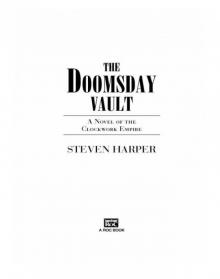 The Doomsday Vault
The Doomsday Vault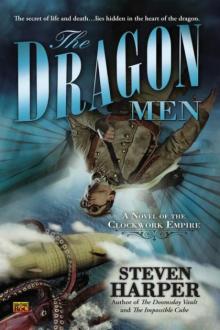 The Dragon Men ce-3
The Dragon Men ce-3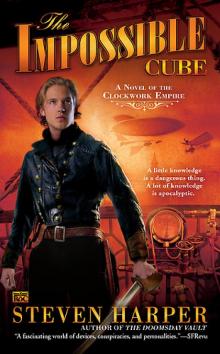 The Impossible Cube
The Impossible Cube Blood Storm: The Books of Blood and Iron
Blood Storm: The Books of Blood and Iron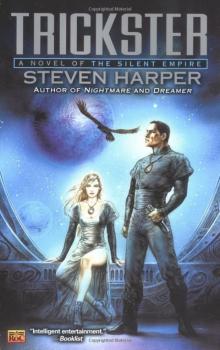 Trickster se-3
Trickster se-3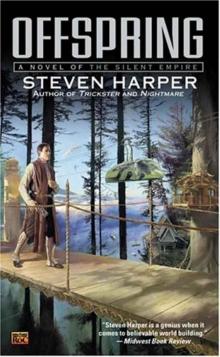 Offspring
Offspring Bone War
Bone War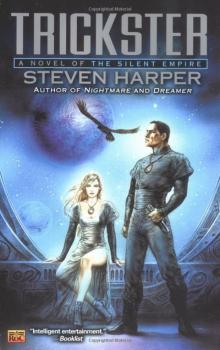 Trickster
Trickster Unity
Unity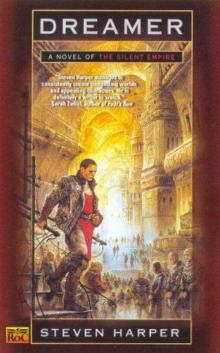 Dreamer
Dreamer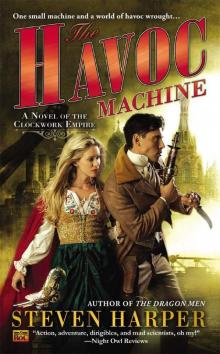 The Havoc Machine ce-4
The Havoc Machine ce-4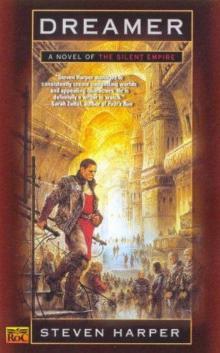 Dreamer se-2
Dreamer se-2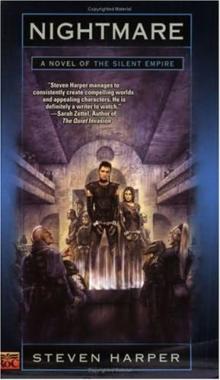 Nightmare se-2
Nightmare se-2